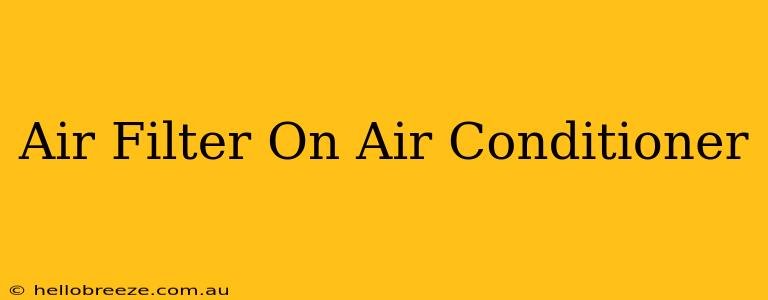Maintaining a clean and efficient air conditioning system is crucial for both your comfort and your health. A significant component of this maintenance is regularly checking and replacing your air conditioner's air filter. This comprehensive guide will walk you through everything you need to know about air filters in your AC unit.
Understanding the Importance of Air Conditioner Air Filters
Your air conditioner's air filter is a vital component that plays a crucial role in several key areas:
-
Improved Air Quality: The primary function is trapping dust, pollen, pet dander, mold spores, and other airborne particles. This significantly improves the air quality within your home, creating a healthier environment, especially for those with allergies or respiratory sensitivities.
-
Enhanced AC Efficiency: A clogged filter restricts airflow, forcing your AC unit to work harder to cool your space. This increased strain leads to higher energy bills and can even shorten the lifespan of your air conditioner. A clean filter ensures optimal airflow and efficient cooling.
-
Preventing Breakdowns: Restricted airflow due to a dirty filter can lead to overheating and potential damage to your AC's internal components, resulting in costly repairs or premature failure. Regular filter changes are a simple preventative measure that can save you money in the long run.
How Often Should You Change Your Air Conditioner Air Filter?
The frequency of air filter replacement depends on several factors, including:
-
Type of filter: Different filter types (e.g., pleated, electrostatic, HEPA) have varying capacities and lifespans. Check the manufacturer's recommendations for your specific filter.
-
Household environment: Homes with pets, smokers, or individuals with allergies will require more frequent filter changes due to increased airborne particles.
-
Usage: The more you run your air conditioner, the faster the filter will become clogged.
General Guideline: As a general rule of thumb, aim to inspect your air filter at least once a month. Replace it every 1-3 months, or sooner if it appears visibly dirty or clogged. A dirty filter will often appear dark grey or black.
Choosing the Right Air Filter for Your Air Conditioner
Selecting the appropriate air filter is essential for optimal performance and air quality. Consider these factors:
-
MERV Rating: The Minimum Efficiency Reporting Value (MERV) rating indicates the filter's ability to trap particles of different sizes. Higher MERV ratings generally indicate better filtration, but they can also restrict airflow more significantly. Find a balance that suits your needs.
-
Filter Size: Ensure you purchase a filter that precisely matches the dimensions of your air conditioner's filter slot. Incorrect sizing can compromise airflow and efficiency.
-
Filter Type: Various filter types are available, including:
- Pleated filters: Offer a larger surface area for trapping particles.
- Electrostatic filters: Use static electricity to attract and trap particles.
- HEPA filters: Provide exceptional filtration, removing even the smallest particles, but can restrict airflow more significantly.
Step-by-Step Guide to Replacing Your Air Conditioner Air Filter
Replacing your air filter is a simple task that can be completed in minutes:
-
Locate the air filter: The location varies depending on the air conditioner model, but it's often found behind a panel on the unit itself or in the return air duct. Consult your AC's owner's manual if needed.
-
Turn off the air conditioner: Always switch off the AC unit before attempting any maintenance.
-
Remove the old filter: Carefully remove the old, dirty filter.
-
Inspect the filter compartment: Check for any debris or dust buildup inside the compartment and clean it as needed.
-
Install the new filter: Insert the new filter, ensuring it's correctly positioned and aligned.
-
Turn on the air conditioner: Switch the unit back on and allow it to run.
Maintaining Clean Air: Beyond Filter Changes
While regular filter replacements are crucial, other practices contribute to maintaining clean air and optimal AC performance:
-
Regular professional maintenance: Schedule annual checkups and servicing by a qualified HVAC technician.
-
Clean vents and registers: Regularly clean vents and registers to remove dust and debris that can hinder airflow.
-
Keep the area around the unit clear: Ensure proper ventilation around the AC unit to prevent overheating.
By following these guidelines and prioritizing regular air filter maintenance, you can ensure your air conditioner operates efficiently, delivers clean air, and extends its lifespan. Remember, a simple filter change can make a significant difference in both your comfort and your wallet!

